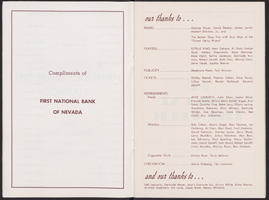Search the Special Collections and Archives Portal
Search Results
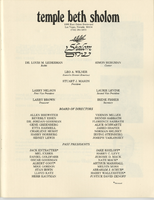
Program from event commemorating retirement of Leo Wilner as Executive Director of Temple Beth Sholom, 1984
Date
Archival Collection
Description
Program booklet for the testimonial dinner held for Leo Wilner's retirement includes dedications from colleagues and friends.
Text
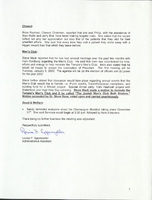
Minutes from Temple Beth Sholom Board of Directors meetings, June 1999 - December 1999
Date
Archival Collection
Description
Meeting minutes include reports from committees of the board, correspondence, and balance sheets.
Text
Jewish Nevada Records
Identifier
Abstract
The Jewish Nevada Records document the organization's philanthropic activities in Las Vegas, Nevada from 1978 to 2018. The majority of the collection represents the organization's activities under the name the Jewish Federation of Las Vegas. The collection includes administrative files, annual reports, marketing materials, donation records, video recordings of interviews and events, and audio recordings of board meetings. The collection also includes photographic prints and negatives of events hosted by Jewish Nevada.
Archival Collection
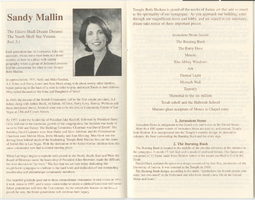
Invitation and program for Temple Beth Sholom building dedication, September 2000
Date
Archival Collection
Description
Temple Beth Sholom invitation and program for the building dedication includes a guide to the Judaic art in the synagogue and a list of past presidents.
Text
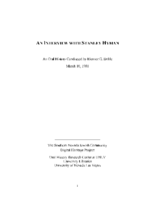
Transcript of interview with Stanley Hyman by Eleanor Doble, March 10, 1981
Date
Archival Collection
Description
Interview with Stanley Hyman by Eleanor Doble on March 10, 1981. In this interview, Hyman discusses his job as a district manager for Farmers Insurance group, which brought him to Reno, Nevada in the 1940s, then to Las Vegas in 1951. He talks about the population growth of Las Vegas, and comments that the infrastructure of the city did not improve with the population growth. He also talks about some local disasters, the economy, entertainment, and the convention business in the area. He speaks briefly about recreation at Lake Mead and Mount Charleston, and atomic tests. The interviewer asks about women in leadership positions in hotels and in the insurance business.
Text
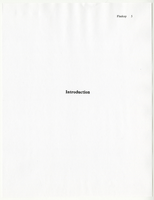
Jews Wandering in the Desert: A History of the Jewish Community of Las Vegas by Joel Fleekop, May 1, 2000
Date
Archival Collection
Description
Joel Fleekop's senior honors thesis from Brandeis University titled: "Jews Wandering in the Desert: A History of the Jewish Community of Las Vegas."
Text
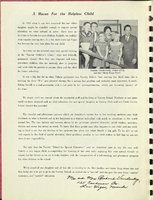
Program for Gay 90s Revue by Variety Club Number 39, November 1960
Date
Archival Collection
Description
This program has fundraising advertisements from community members, celebrities and performers in Las Vegas who supported the event that benefited the Variety Club.
Text
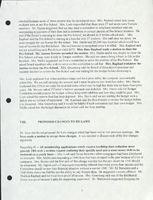
Minutes from Temple Beth Sholom Board of Directors meetings, June 1996 - May 1997
Date
Archival Collection
Description
Meeting minutes include reports from committees of the board, correspondence, and balance sheets.
Text
Transcript of interview with Count Guido Roberto Deiro by David G. Schwartz, January 30, 2002
Date
Archival Collection
Description
Count Guido Roberto Deiro, born in Reno, Nevada, in 1938, has had several fascinating careers. The son of vaudeville performer and recording star Count Guido Pietro Deiro, who was the first major piano-accordionist to become popular in the United States, and his teenage wife Yvonne Teresa LeBaron De Forrest, Deiro grew up in and around Las Vegas and Southern California after his parents' 1941 divorce. After attending 13 grammar schools and five high schools, Deiro graduated from Las Vegas High School in 1955. During his youth, thanks to his stepfather Samuel "Baby Shoes" Prezant, Deiro had an early introduction to the Las Vegas gambling scene. Following a brief stint in the U.S. Army, Deiro worked a series of jobs, including parking cars, selling shoes, and driving an ambulance. He transitioned from working as a fitness instructor to being a lifeguard at the El Rancho Vegas hotel, all the while becoming interested in aviation. Deiro entered the gaming industry at the age of 19 and a half, when he began working as a dealer, having been taught by his stepfather. Breaking in at the Nevada Club, Deiro, who became known as "Bobby Blue Eyes," later worked at the New Frontier, Sands, El Cortez, and Holiday casinos. He provides a great deal of detail about the social world of Las Vegas casinos in the 1950s through the 1970s, with insight into many major personalities. While working in gaming, Deiro continued to pursue a career in aviation, acquiring in the early 1960s a commercial pilot license, instrument rating and instructor's certificate. He began working as a flight instructor and charter pilot at Thunderbird Field, now known as North Las Vegas Air Terminal. Deiro flew around the United States promoting Las Vegas and the airfield. After Howard Hughes purchased the airfield in 1967, Deiro stayed, ultimately becoming Director of Aviation Facilities for the Hughes Tool Company. Following his marriage to Joan Marlene Calhoun, Deiro moved to California, where he became Vice President and Director of Administration for Air California and Golden West Airlines, before serving with other companies owned by C. Arnholdt Smith. In 1971, Deiro returned to Las Vegas. Deiro then met artist Michael Heizer, who enlisted Deiro's help in scouting and securing locations for his Earth art installations. This led to Deiro's long involvement with that genre. In addition to these careers, Deiro was also influential in many key developments in Las Vegas, including the construction of the Las Vegas Motor Speedway and, with his wife Joan, several philanthropic endeavors. In this interview, Deiro shares his perspectives on his times and his impact on Las Vegas.
Text

